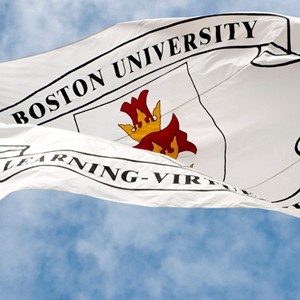The College of Engineering has earned its highest ranking from U.S. News & World Report, placing 35th among its peer American schools in the magazine’s latest rankings. It’s a two-slot advance from last year and a long jump from a decade ago, when the school placed 52nd, says Kenneth Lutchen, dean of ENG.
Additionally, ENG’s biomedical engineering instruction ranked ninth among such programs nationally. The ratings of 194 engineering schools considered peer assessments, student selectivity, student-faculty ratios, the number of doctoral degrees granted, and research funding, among other factors.
Lutchen attributes his school’s success to several strengths, starting with a commitment to interdisciplinary research across both the college and the University, “recruiting complementary faculty in areas such as photonics, information and cyber-physical systems, the intersection of engineering and biology, advanced materials, and nanotechnology.” That approach, he says, has garnered “tremendous extramural funding success among our faculty.”
Second, in recent years, ENG boosted research and educational partnerships with industry, using assessments of the school’s programs by these partners to improve them. Meanwhile, Lutchen says, the ENG faculty has matched prowess at securing funding with “scholarship in their field, and in how that scholarship eventually impacts societal challenges.”
Over the past decade, ENG’s rankings have marked “the largest single improvement of any engineering school in the country” among those that made the top 52 in 2006, he notes. Every one of its degree programs now scores in the top 20 in its discipline among private universities, he says, adding that that has real-world effects, helping “attract ever-higher quality in our faculty and our PhD students.”
Other BU schools also fared well in the current U.S. News rankings. The Questrom School of Business full-time MBA program ranked 41st, up from 43rd. Kenneth Freeman, the school’s Allen Questrom Professor and Dean, attributes the showing to a curriculum evolving with the business world.
“The needs of today’s business students are rapidly changing,” Freeman says. “Through curriculum enhancements, we continue to provide a highly relevant degree program, which is attracting exceptional students and resulting in strong career advancements—both crucial factors in this ranking.” The U.S. News nod follows improved rankings as well for the school from The Economist magazine, the Financial Times, and Bloomberg Businessweek, according to the dean. “Although rankings are not perfect, they do help inform prospective student choices,” he says.
The School of Law clocked in at number 20 in the U.S. News rankings, a six-slot jump from last year and a tie with the University of Iowa. The school’s health law program was ranked second best of its kind, up from fifth place last year. Health law involves legal issues around public health and regulation of health care, medical research, food, and pharmaceuticals.
While pleased with the ranking, Maureen O’Rourke, dean of LAW, says that “it is more important to stress that our commitment to building an excellent faculty and preparing our students to be leaders in the law is the same, no matter what our rank is.”
The School of Education placed 45th, up from 52nd last year. Hardin Coleman, dean of SED, says the U.S. News education school rankings generally pivot on faculty research and service in the teaching field.
“Our rise in the rankings reflects the outstanding faculty we have recruited over the past eight years,” he says. “Our faculty have been supported to develop important programs of research that are getting recognized in the field,” while also taking visible leadership roles in various educational organizations.
With help from rankings, “an improved reputation will make us a more desirable target for investment from federal and state agencies as well as foundations,” Coleman adds.
















































It is heartening, indeed, to follow the growth, development, and recognitions of Boston University! My congratulations to all!